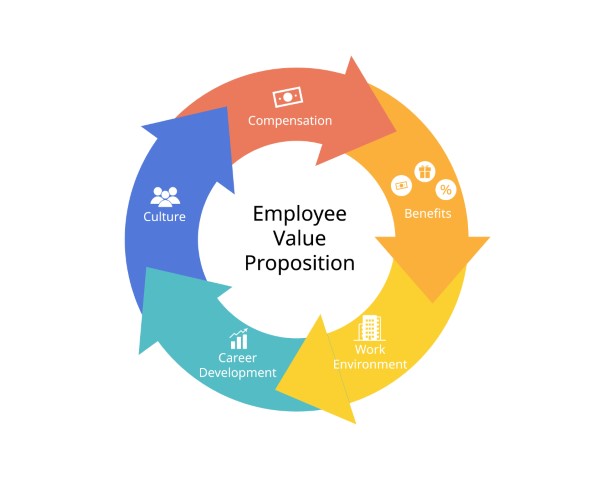Want to attract and keep more employees and increase productivity? A detailed Employee Value Proposition (EVP) will help! An EVP gives potential employees a clear sense of what they will get for working with a company. The EVP describes financial compensation, benefits packages, career growth opportunities, work-life balance, company culture, recognition, and other hard-to-measure factors that contribute to a positive work experience. It represents the unique combination of factors and advantages that make a company a desirable workplace for potential and current employees.
A well-defined and compelling EVP helps attract top talent, create a positive environment, increase employee engagement and retention, and make your company the employer of choice in your industry. It also increases your chances of attracting candidates who naturally fit in and appreciate the benefits they’ll receive for their skills and expertise. On the other hand, those who don’t align with the EVP will be less likely to apply.
It may sound easy, but figuring out what makes your organization stand out for its employees is more challenging than just coming up with a catchy slogan or picture. It requires deep thinking about the real value you provide. We’ve created this article to help you learn why you need one, how to create one, and how to measure your results.
Table of Contents
- What is an Employee Value Proposition
- Does Your Company Need an Employee Value Proposition?
- What are Examples of Employee Value Proposition?
- How to Create an Employee Value Proposition That Works
- How to Know if Your EVP Is Working
What is an Employee Value Proposition?
Before we get started, let’s explain exactly what an Employee Value proposition (EVP) is. An EVP is a unique and compelling set of benefits, rewards, and opportunities that an organization offers to its employees. It represents the comprehensive package of what employees receive in return for their skills, expertise, and contributions to the company. The EVP serves as a strategic tool for attracting, engaging, and retaining top talent by highlighting the distinct attributes and advantages of working for a particular organization. It encompasses various elements such as competitive compensation, career development opportunities, a positive work environment, work-life balance initiatives, company culture, and other perks that contribute to the overall employee experience. A well-defined EVP not only sets a company apart from competitors in the job market but also fosters a sense of commitment and loyalty among existing employees, ultimately driving organizational success.
Does Your Company Need an Employee Value Proposition?
The short answer is yes because every business that wants to attract and retain top talent needs an Employee Value Proposition. The more detailed explanation is that a well-done EVP strengthens your business position in your industry, makes you more attractive to employees, and delivers significant ROI.
Here are eight key reasons your company needs an EVP:
- To Attract Top Talent: In this highly competitive job market, having a compelling EVP helps businesses stand out and attract the best candidates for their job openings. A well-defined EVP communicates the company’s unique benefits and opportunities, making it an appealing destination for top talent.
- To Retain Employees: An EVP plays a significant role in retaining employees. Valued and engaged employees are more likely to stay with the company long-term. That’s great news for your bottom line because lower turnover reduces the costs of hiring and training new employees.
- To Enhance Your Brand Image: A strong EVP contributes to a positive employer brand. Word-of-mouth and positive reviews from satisfied employees can attract more talent and create a reputation as an employer of choice.
- To Highlight Organizational Goals: A well-crafted EVP aligns the interests and aspirations of employees with the company’s goals. When you anchor your EVP in the company’s core goals, they foster a sense of purpose, commitment, and community among employees.
- To Stand Out in a Noisy Market: A robust EVP differentiates your company from your competitors, especially if you offer unique benefits or a strong company culture that sets it apart in the eyes of potential employees.
- To Boost Employee Satisfaction: Satisfied employees are more likely to be loyal and advocate for the company. A robust EVP can address employees’ needs, making them feel appreciated and satisfied in their roles.
- To Increase Employee Engagement: When employees appreciate the salary, incentives, and perks you offer, their engagement increases and performance improves. More engaged employees are more productive and less likely to seek other employment.
- To Adapt to Changes in Workforce Demographics: With shifting workforce demographics, such as millennials and Gen Z entering the workforce, businesses need to adjust their EVP to align with the expectations and values of these new generations.
What are Examples of Employee Value Proposition?
Every organization’s EVP is unique and should be tailored to meet the specific needs and values of its employees. A compelling EVP helps in attracting and retaining top talent, fostering a motivated and engaged workforce, and ultimately contributing to the organization’s success. Here are some examples of powerful Employee Value Propositions:
- Competitive Compensation and Benefits: Offering a competitive salary and comprehensive benefits package is a fundamental aspect of any EVP. This includes health insurance, retirement plans, paid time off, flexible work arrangements, and other perks that enhance the overall employee experience.
- Career Development and Growth Opportunities: Employees seek opportunities to grow and advance their careers. A strong EVP includes training programs, workshops, mentoring, and clear pathways for career progression within the organization.
- Work-Life Balance: Promoting work-life balance demonstrates an organization’s commitment to the well-being of its employees. Flexible work hours, telecommuting options, and family-friendly policies contribute to a positive EVP.
- Positive Work Environment and Company Culture: A healthy work environment and a positive company culture can be powerful attractions for potential employees. Organizations that emphasize teamwork, inclusivity, and employee recognition often have a compelling EVP.
- Employee Wellness Programs: Wellness initiatives, such as fitness classes, mental health support, and wellness incentives, can be significant aspects of an EVP, showing a commitment to employee health and overall well-being.
How to Create an Employee Value Proposition That Works
Creating an enticing employee value proposition involves a thoughtful and strategic approach to attracting and retaining top talent. Your EVP should strike a healthy balance between consistency and agility, standard features and innovative offerings, and tangible and less tangible benefits.
10 Steps to Develop a Robust EVP that delivers
- Research and Understand Your Target Audience: Understand your target employees’ needs, preferences, and aspirations. Conduct surveys, focus groups, and interviews with current employees and potential candidates to gather insights.
- Identify Unique Selling Points: Determine what sets your company apart from others in your market and what makes it an exceptional workplace. This could include factors like a strong company culture, opportunities for career growth, a supportive work environment, or innovative perks.
- Align with Company Values and Goals: Ensure your EVP aligns with the company’s mission, vision, and values. This will create a coherent and authentic representation of your organization’s stand.
- Highlight Opportunities for Career Growth: Emphasize the potential for professional development and growth within the company. Employees want recognition, appreciation, and promotions for their hard work.
- Communicate Total Rewards Package: Clearly outline the total rewards package, including competitive salaries, bonuses, benefits, and any unique perks the organization offers.
- Showcase Work-Life Balance Initiatives: Highlight any work-life balance initiatives or flexible work arrangements that promote employee well-being.
- Emphasize Company Culture: Showcase your company’s culture, values, and the positive impact employees can make while working together towards a common goal.
- Use Engaging and Genuine Messaging: Craft EVP messaging that resonates with the target audience and communicates your organization’s unique value proposition in a compelling and genuine way.
- Involve Employees in the Process: Engage current employees in the EVP development process to gain their insights and perspectives, which leads to a more accurate representation of the organization’s strengths.
- Monitor and Refine: Continuously monitor the effectiveness of your EVP and make necessary adjustments based on feedback and changing needs of employees and the job market.
A successful Employee Value Proposition is not just a marketing tool. It’s also one of the best retention and employee engagement tools you can create. A comprehensive EVP delivered consistently reflects the company’s commitment to its employees. Thoughtfully designing a program that spans the employment life cycle from recruitment to retirement creates a positive and fulfilling work experience for everyone in the organization.
How to Know if Your EVP Is Working
Like every effective business strategy, it’s important to regularly measure whether or not your EVP is resonating with potential employees. Analyzing critical recruitment data such as the number of quality applicants, how long it takes to fill open positions, and gauging candidate feedback provides crucial data on the EVP’s impact on hiring.
Gathering data on your employee retention rates and turnover helps you evaluate how your EVP impacts new hires and long-term employees. Employee surveys and engagement assessments gauge how well the EVP meets current employees’ expectations and if it encourages them to stay with your company.
When employees do leave, gather their feedback during exit interviews to determine if your EVP lived up to the promises made during recruitment. If the employee experience doesn’t match your EVP, it undermines your integrity and may increase turnover.
Remember to monitor your workforce’s overall performance and productivity. These metrics help determine if the EVP fosters a motivated and high-performing team. Regularly reviewing and adjusting your EVP based on these evaluations ensures that it remains a relevant and effective tool for attracting, retaining, and engaging top talent while contributing to the company’s success.
Building a compelling Employee Value Proposition based on what employees want most helps your company attract and keep high-quality employees who are looking for a supportive work community. Learn more about how we can help!


